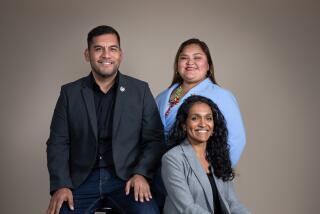Family is name of the game in Chicago’s political arena
CHICAGO — When it comes to politics in the Windy City, keeping power in the family is a well-established practice. This is why, when voters turn out for the city’s election later this month, they will see some familiar names on the ballot.
There’s Mayor Richard M. Daley, who is running for his sixth term in office. If he wins, Daley will surpass his father as Chicago’s longest-serving mayor.
Then there’s Darcel A. Beavers, the daughter of longtime alderman William Beavers, who was appointed to fill her father’s City Council seat late last year. Now she’s campaigning to keep the seat, which opened up when her father moved over to the Cook County Board of Commissioners.
That exchange was set in motion this summer, when Cook County Board President John H. Stroger Jr. retired after a stroke left him bedridden. Stroger’s son Todd, an alderman, replaced his father on the fall ballot and won the presidency.
Todd Stroger’s City Council seat? Daley appointed Michelle A. Harris, a niece of the late Alderman Lorraine Dixon. Now Harris, too, is running to keep her seat in the Feb. 27 election.
“Politics is considered a family affair here, in part because Chicago is still a city of neighborhoods,” said Paul Green, director of policy studies at Roosevelt University in Chicago. “The tradition among voters is that local politics are more important than state politics. People know more about their alderman than their governor. Because of that, a good, or at least well-known, family name here in politics carries weight.”
The Daley family, of course, is a name synonymous with Chicago: Since 1955, when Richard J. Daley was first elected mayor, a Daley has led this city for 39 of the last 52 years.
The more senior Daley, referred to by some as “Richard the First,” was a controversial backroom dealer whose tenure is remembered for cronyism, racial troubles and the infamous conflict between the Chicago police and antiwar demonstrators outside the 1968 Democratic National Convention.
Foes saw him as manipulating a corrupt political system, but allies said he was responsible for helping Chicago’s business community and culture to blossom.
Both sides, however, agree that Daley the father, who died in 1976, helped pave the path for his son’s ascension to City Hall. After earning his undergraduate and law degrees from DePaul University, Richard M. Daley entered politics, winning election to the Illinois Constitutional Convention in 1969.
Tapping the strength of his father’s political machine, Daley won a seat in the state Senate, was elected Cook County state’s attorney three times, and in 1989 was elected mayor.
Over the years, he has become known as much for his temper as his voter support -- despite an ongoing series of federal probes that have resulted in the convictions of dozens of former and current state and city workers. Last year, Robert A. Sorich, Daley’s former patronage chief, received a prison sentence for his part in a scheme to place pro-Daley political workers in city jobs.
“Daley now is weaker politically because of the scandals, and all signs are showing that he’s not intervening in the aldermanic races as much as he normally would,” said Dick Simpson, a University of Illinois professor and author of “Rogues, Rebels, and Rubber Stamps: The Politics of the Chicago City Council From 1863 to the Present.”
“That opens up the City Council races in a way that we haven’t seen in years,” Simpson said.
Being able to keep aldermen in line on council votes -- particularly on hotly contested issues, such as last year’s veto of minimum wage increases for “big box” stores such as Wal-Mart -- is crucial for Daley, said Jay E. Stewart, executive director of the nonpartisan Better Government Assn. And one of the more hotly contested seats -- a race underscoring the clash of political family powerhouses -- is the fight between rival Democrats in the 7th Ward, in southeast Chicago.
On one hand is Beavers, 47, the recent Daley-appointed incumbent. While campaigning, Beavers has repeatedly reminded voters of the more than two decades she worked alongside her father: As his chief of staff, she has said, she answered the public’s complaints, helped them with their utility and tax bills, and maintained a connection to the needs in the community.
On the other is Sandi Jackson, 43, wife of Rep. Jesse L. Jackson Jr. (D-Ill.). An attorney, she is on leave from her job as deputy political director of training for the Democratic National Committee.
In recent weeks, billboards have popped up around the area promoting Jackson’s first-time bid for office. The ads, which also feature pictures of her husband, were a gift from the congressman to his wife.
Such high-profile connections exasperate Ronald A. David, who is also running for the 7th Ward seat.
“I’ve been a Chicago police officer for 25 years, and that might mean something in some cities. Here, I don’t think it means nearly as much as the power of family,” said David, 49, also a Democrat. “I have no family in politics. I’m not married to a politician. I’m actually campaigning on the fact that I’m not from a well-known family. Wish me luck.”
He’ll need it. Though Daley’s sway over the City Council may be changing, recent polls have found that the mayor’s popularity with the public remains high, and his fundraising has overshadowed his challengers’.
“A lot of people have more or less conceded the election to the mayor,” Stewart said. “Now, the question is whether, like Daley, family ties and a family name will help out the candidates in the aldermanic races.”
More to Read
Sign up for Essential California
The most important California stories and recommendations in your inbox every morning.
You may occasionally receive promotional content from the Los Angeles Times.










